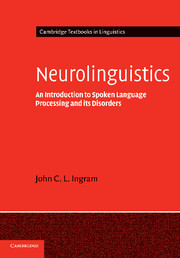Book contents
- Frontmatter
- Contents
- List of figures
- List of tables
- Preface and acknowledgements
- Note on the text
- Part I Foundational concepts and issues
- Part II Speech perception and auditory processing
- Part III Lexical semantics
- Part IV Sentence comprehension
- 12 Sentence comprehension and syntactic parsing
- 13 On-line processing, working memory and modularity
- 14 Agrammatism revisited
- Part V Discourse: language comprehension in context
- Glossary
- References
- Index
14 - Agrammatism revisited
Published online by Cambridge University Press: 26 January 2010
- Frontmatter
- Contents
- List of figures
- List of tables
- Preface and acknowledgements
- Note on the text
- Part I Foundational concepts and issues
- Part II Speech perception and auditory processing
- Part III Lexical semantics
- Part IV Sentence comprehension
- 12 Sentence comprehension and syntactic parsing
- 13 On-line processing, working memory and modularity
- 14 Agrammatism revisited
- Part V Discourse: language comprehension in context
- Glossary
- References
- Index
Summary
Introduction
We suspended discussion of the nature of agrammatic comprehension impairment in chapter 12, in order to consider the role of working memory in sentence processing and to review the methodology of on-line language assessment. With a clearer picture of the alternative (but not necessarily irreconcilable) concepts of working memory resources utilized in volitional and automated language processing, together with an appreciation of the current state-of-the-art in behavioural and neural techniques for monitoring moment-by-moment fluctuations in processing load, we are better equipped to critically evaluate competing theories of receptive agrammatism. But to avoid needless confusion that often attends discussion of this topic, let us be clear what we mean by ‘receptive agrammatism’, how it relates to the clinical classification of aphasia (Broca's, Wernicke's, anomic, conduction and transcortical aphasia), and why this particular language syndrome has preoccupied neurolinguistic research more than any other over the last quarter century or so.
Receptive agrammatism refers to a pattern of comprehension impairment that is revealed by psycholinguistic investigations of the kind described in detail in chapter 12. Subjects manifest an inability to use syntactic cues for sentence comprehension in tests of thematic role assignment, where pragmatic and lexical cues to meaning are rigorously controlled by selection of sentence materials and other aspects of the testing situation. A pattern of comprehension impairment that can be identified as receptive agrammatism has the following attributes: (1) not better than chance performance for agent identification on reversible passive constructions, (2) poor performance on object relative clauses and other structures involving departures from canonical word order, and (3) selective ‘blindness’ to the presence of semantically opaque function words or grammatical affixes.
- Type
- Chapter
- Information
- NeurolinguisticsAn Introduction to Spoken Language Processing and its Disorders, pp. 297 - 328Publisher: Cambridge University PressPrint publication year: 2007



